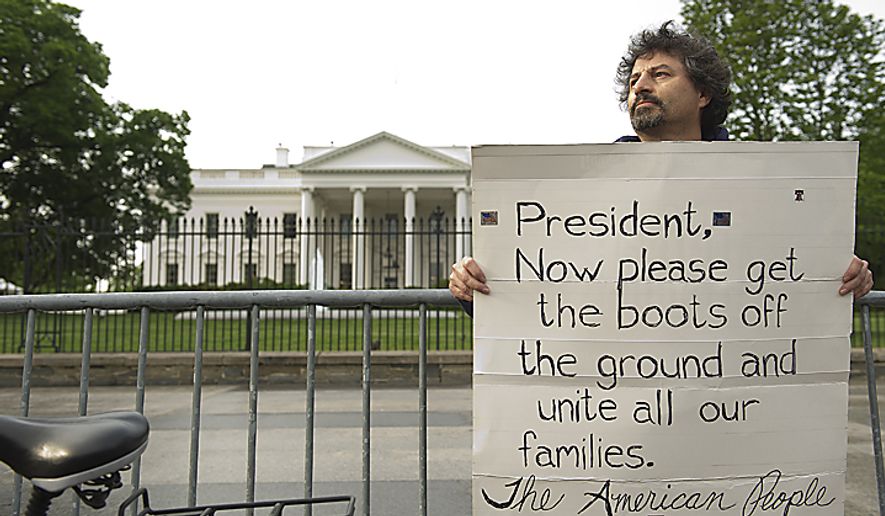President Obama will explain Wednesday night his plan for withdrawing U.S. troops from Afghanistan, with indications of a more rapid recall of soldiers than military advisers recommended but not enough to satisfy his liberal allies.
The president will announce his plan in a televised address from the White House at 8 p.m., spokesman Jay Carney said.
The Associated Press, citing an unnamed senior U.S. defense official, said Mr. Obama likely would pull out 5,000 troops this summer and another 5,000 by year’s end, with the withdrawal of another 20,000 at a date still to be determined. Congressional sources said lawmakers are being told that 30,000 troops, essentially the size of the surge Mr. Obama ordered to Afghanistan in December 2009, will be brought home by the end of 2012.
That decision would be a more robust schedule for drawing down troops than military chiefs recommended. Defense Secretary Robert M. Gates, who met with the president Tuesday afternoon, and Gen. David H. Petraeus, top commander of forces in Afghanistan, favor an initial drawdown of about 3,000 to 5,000 troops this year, amid concern that strategic gains could be lost if the pullout is too rapid. About 100,000 U.S. troops are serving in Afghanistan.
But Mr. Gates acknowledged Tuesday that the president also had to consider “sustainability here at home,” saying Americans are tired of the 10-year war. At least 1,600 U.S. troops have been killed, and the mission is costing about $10 billion per month.
The White House has sought to portray Mr. Obama as unfazed by political considerations and devoted to ensuring that his decision achieves military goals he laid out for the surge 18 months ago.
“The president … is extremely knowledgeable about the situation in Afghanistan, about the success that our policy has had, that our strategy has met in Afghanistan since the beginning of its implementation in late 2009,” Mr. Carney said. “This decision will be the commander in chief’s.”
Senate Armed Services Committee Chairman Carl Levin, Michigan Democrat, reiterated his call Tuesday for an immediate withdrawal of 15,000 troops.
“The level of U.S. troop reductions in Afghanistan needs to be significant to achieve its purpose - letting the Afghan government know we are determined to shift primary responsibility for their security to the Afghan security forces,” Mr. Levin said.
At least 42 coalition soldiers have died in Afghanistan so far this month. NATO says two of its service members died late Monday during insurgent attacks in eastern Afghanistan.
On Tuesday, a failed suicide attack on a governor in northern Afghanistan killed two people, including a 14-year-old girl. The bomber detonated a suicide vest Tuesday morning outside the office of Parwan provincial Gov. Abdul Basir Salangi as his car passed. Mr. Salangi was not injured in the attack.
Taliban spokesman Zabiullah Mujahid claimed responsibility for the attack in a text message to the Associated Press.
Since a Navy SEAL team killed Osama bin Laden on May 2 in Pakistan, Mr. Obama has been reminding the public that the death of al Qaeda’s leader achieved one of the war’s major objectives. The U.S. invaded Afghanistan in the fall of 2001 because its Taliban regime had harbored bin Laden and al Qaeda while they planned the Sept. 11 terrorist attacks.
The president has said repeatedly that the U.S. can meet his deadline of next month to begin withdrawing troops without compromising Afghan security.
Mr. Carney said the president “is keeping that commitment, and that’s what he will announce” Wednesday night.
At a fundraiser in Washington on Monday night, Mr. Obama told supporters that he is fulfilling his promise by ending the war in Iraq this year and continuing on a path to turn over all security responsibilities to the Afghans in 2014.
“When I came into office, we had two active wars,” Mr. Obama said. “By the end of this year, one war will be done. And we will be transitioning in Afghanistan to turn over more and more security to the Afghan people.”
• Dave Boyer can be reached at dboyer@washingtontimes.com.




Please read our comment policy before commenting.